Abstract
Certain human diseases have been traced to exposure to environmental and occupational chemicals. In many instances the first evidence of potential adverse effects came from experimental studies and were subsequently discovered in humans. Associations of human cancers, as a diverse group of diseases, and chemicals have been made since the middle 1700s. Since then, nearly 100 chemicals, mixtures of chemicals, or exposure circumstances are now recognized as being or strongly implicated as being carcinogenic to humans. Of the less than 1000 agents evaluated adequately for carcinogenicity in laboratory animals, a varying spectrum of data from studies on humans are available for only about 20-25%. So far, more than 60 agents are linked unequivocally as causing cancer in humans, and another 50 or so are strongly suspected of being carcinogenic to humans. Not all of these have been or can be evaluated in animals because some are industrial processes or "occupations," some are environmental and cultural risk factors, and some are mixtures of agents. For those that can be studied experimentally, the qualitative concordance between humans and animals approaches unity, and in every case there is at least one common organ site of cancer in both species. The evidence of carcinogenicity in experimental animals preceded that observed in humans for nearly 30 agents and is the subject of this paper.
Full text
PDF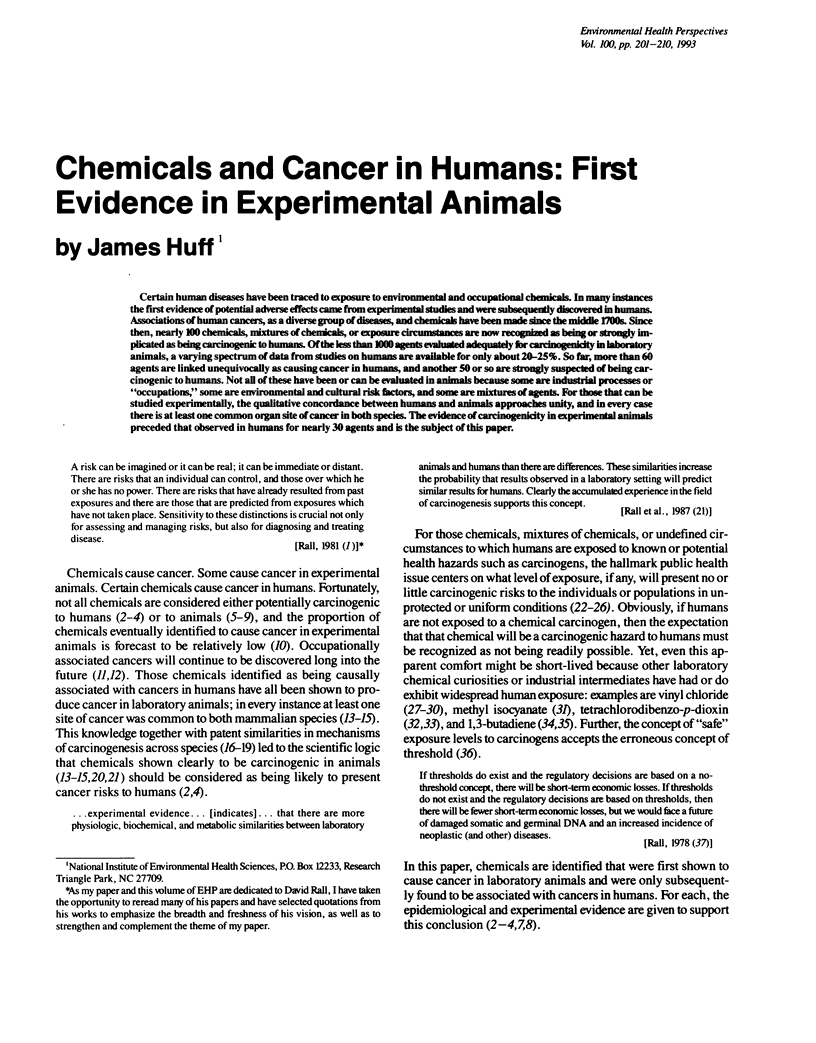
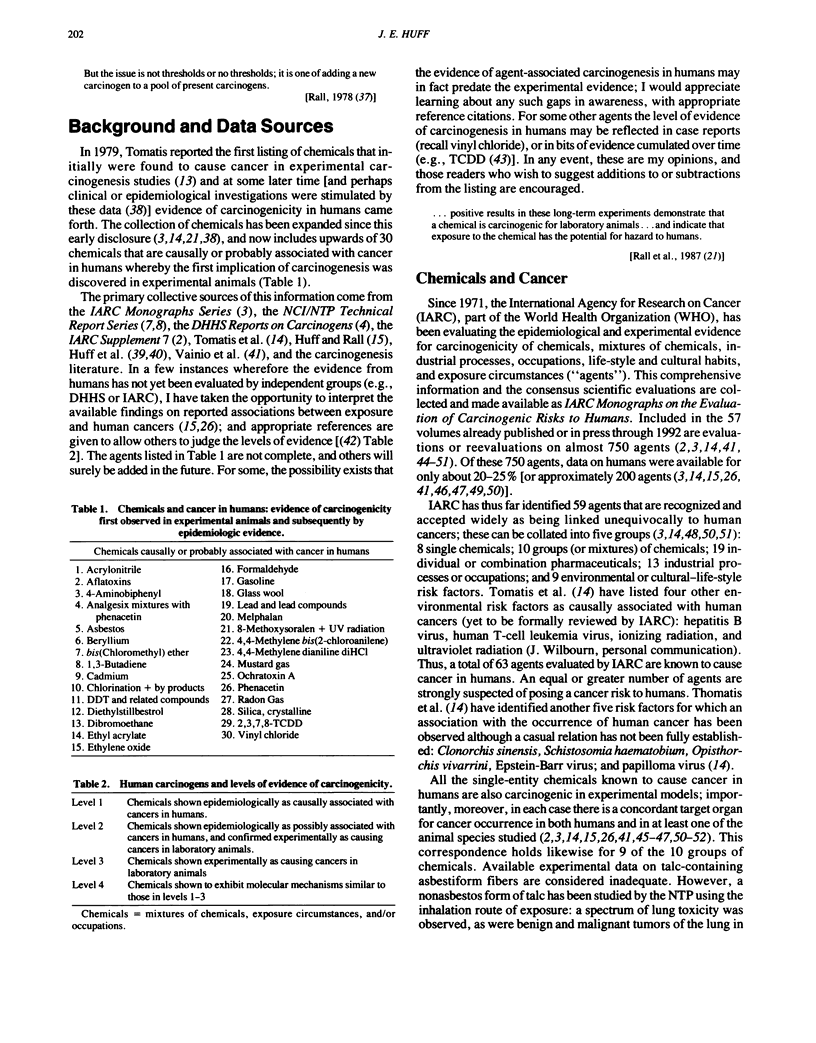
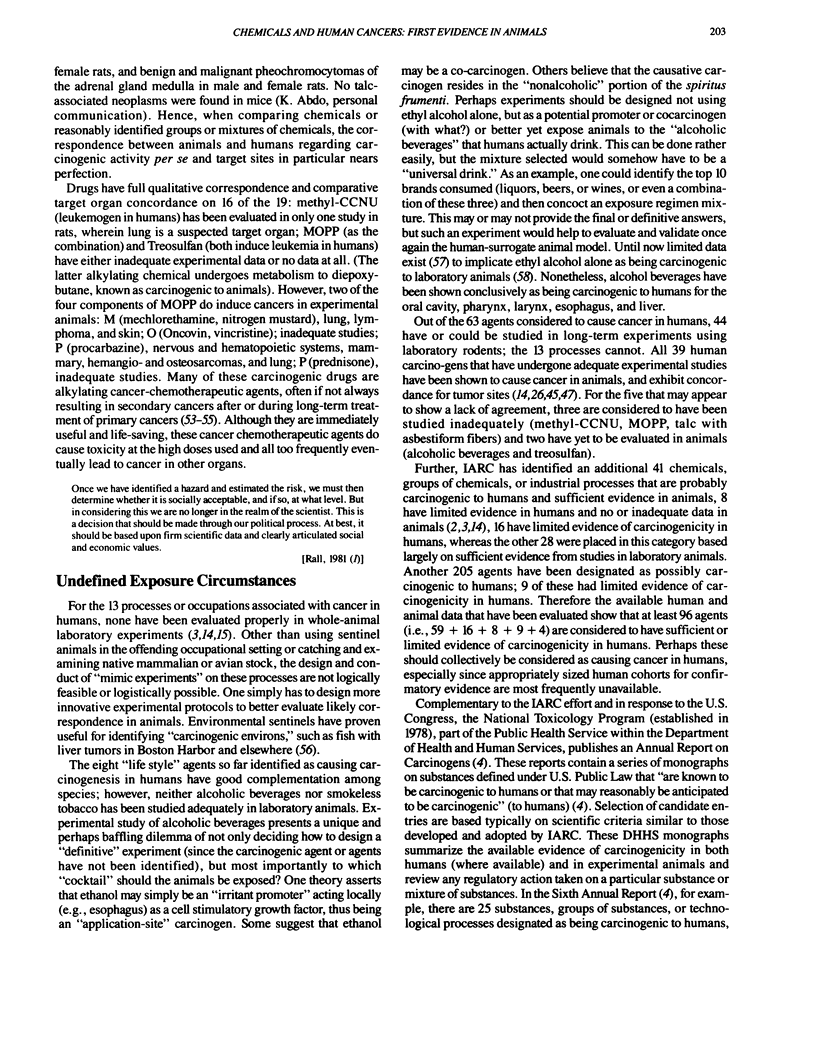
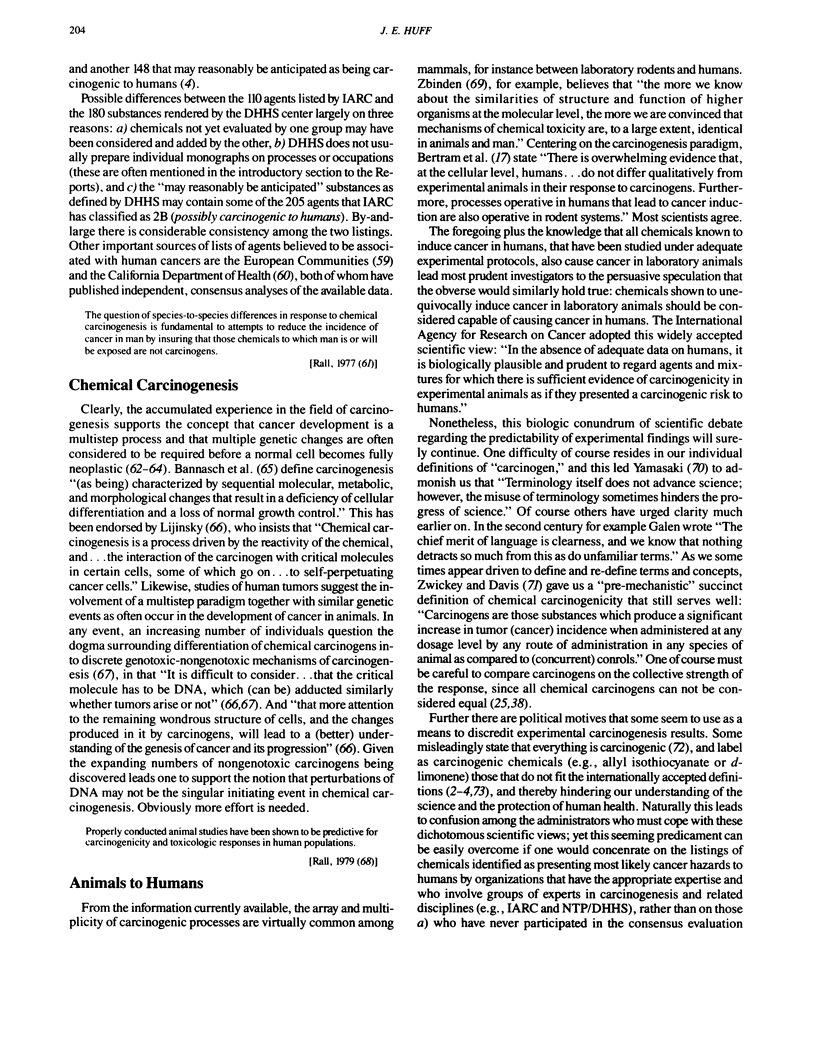
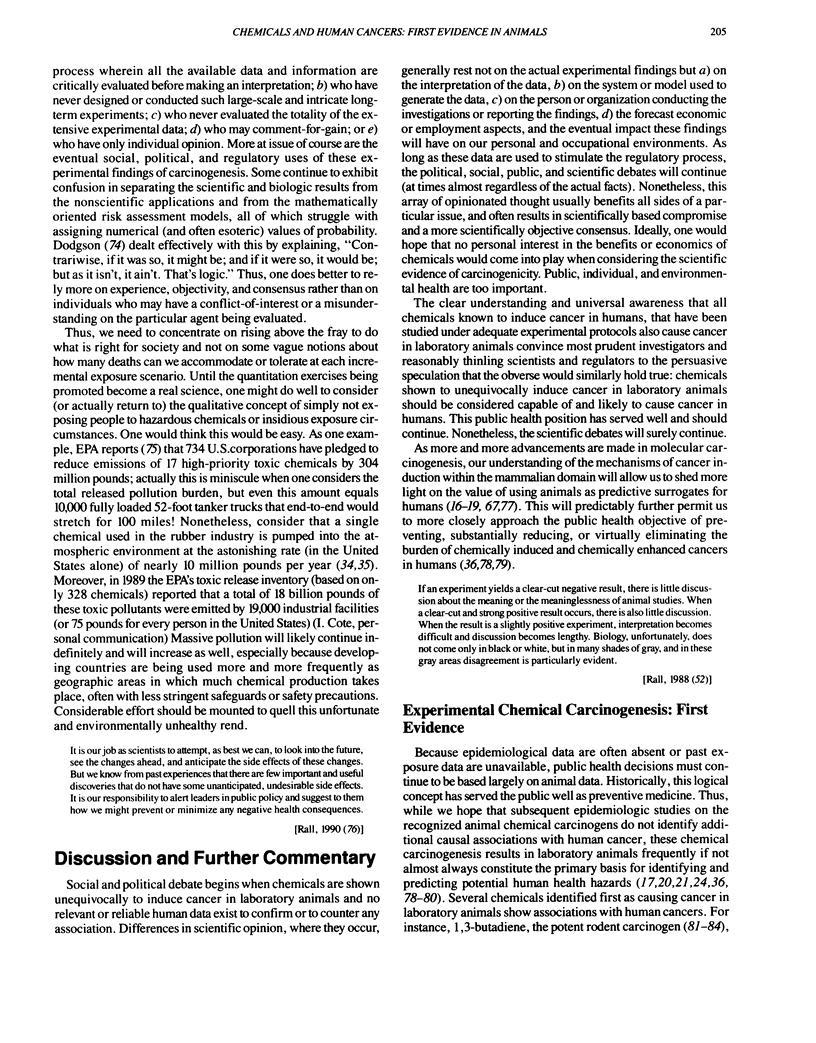
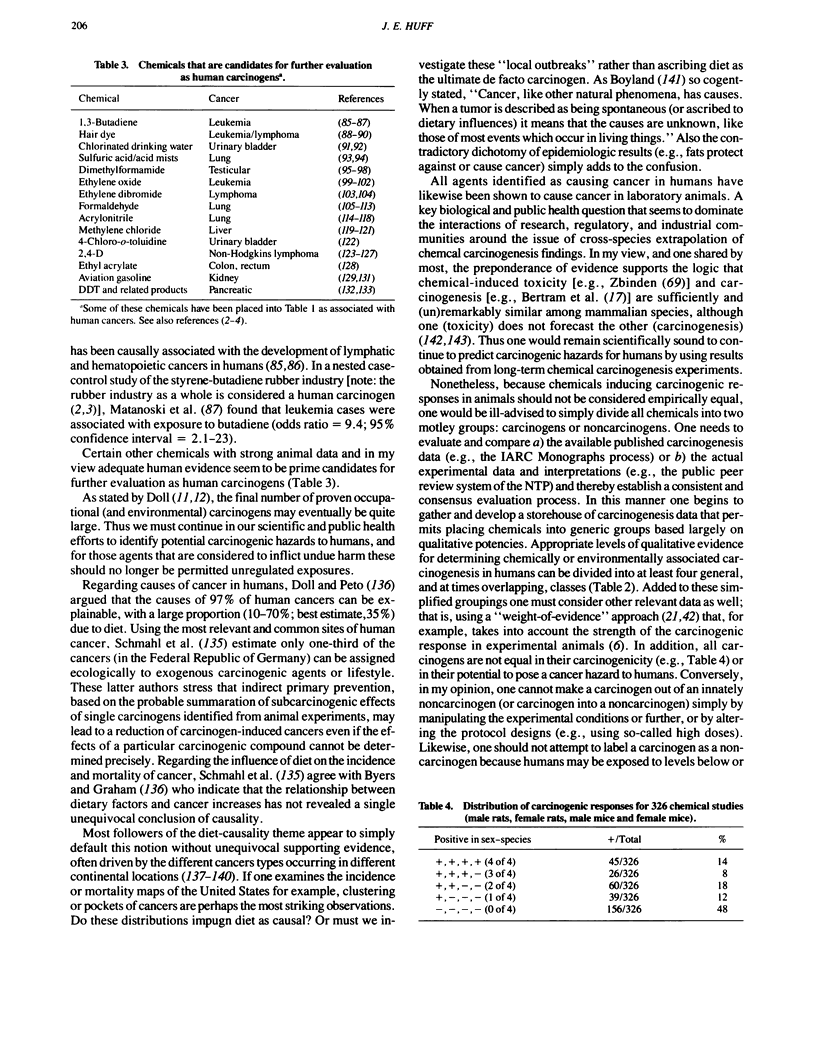
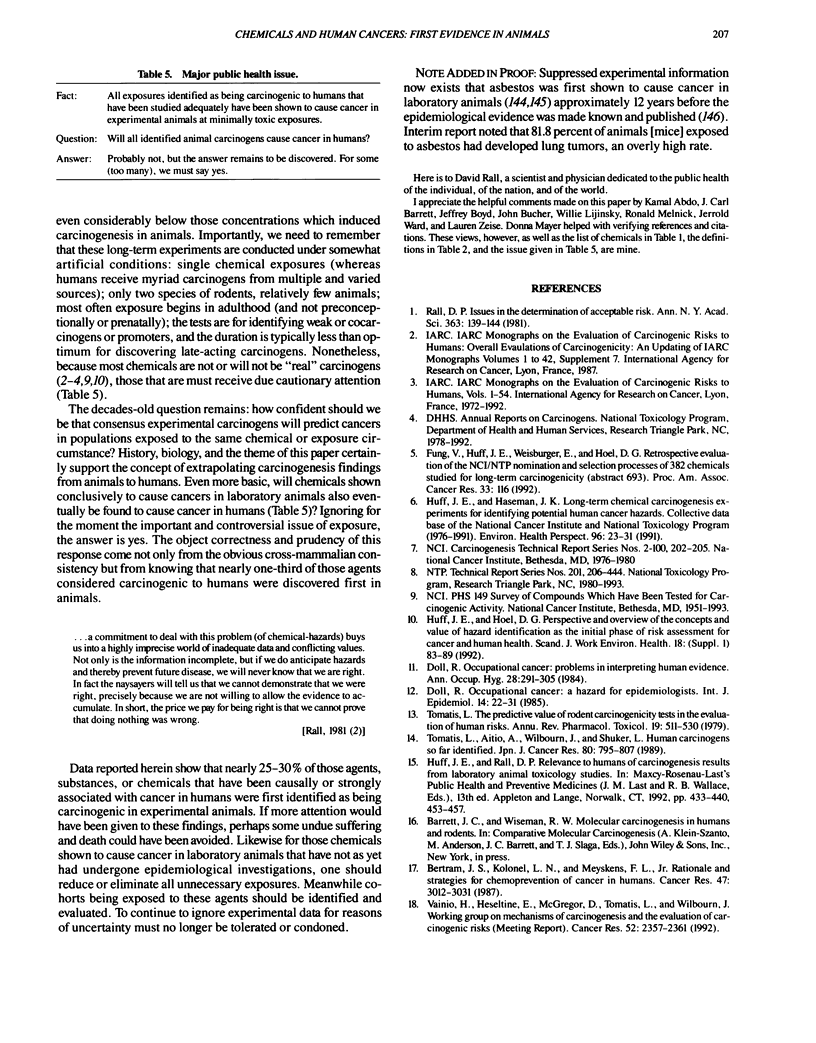
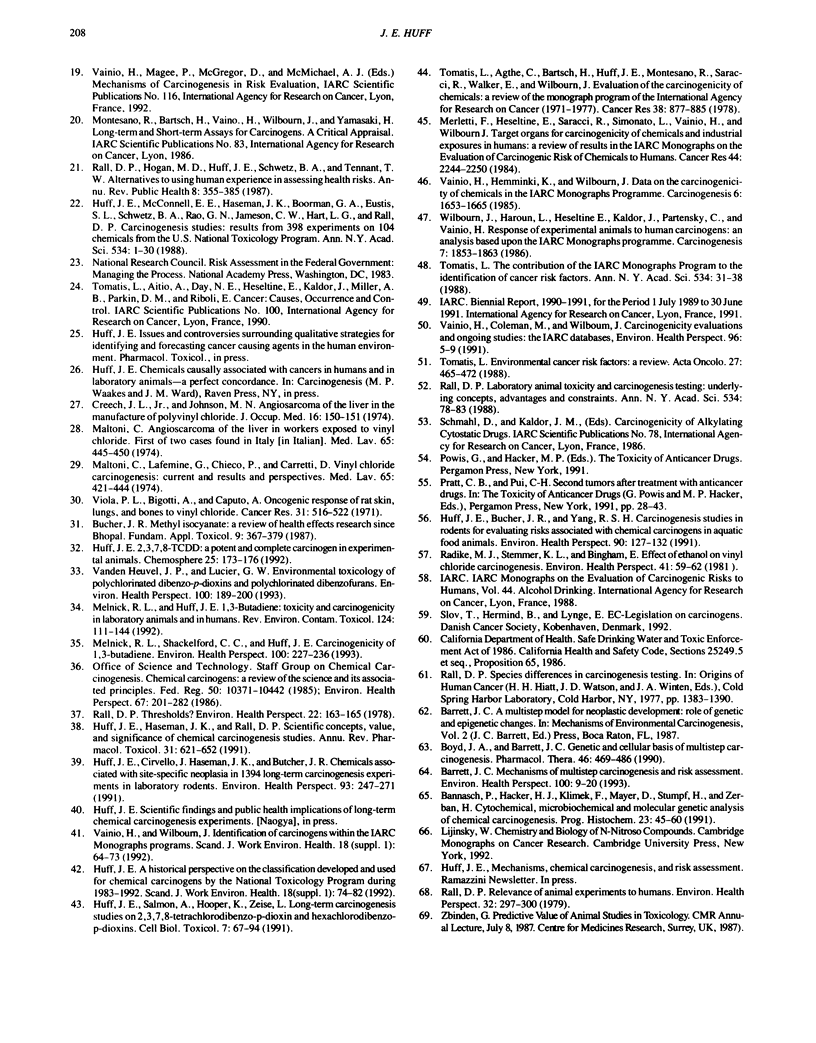
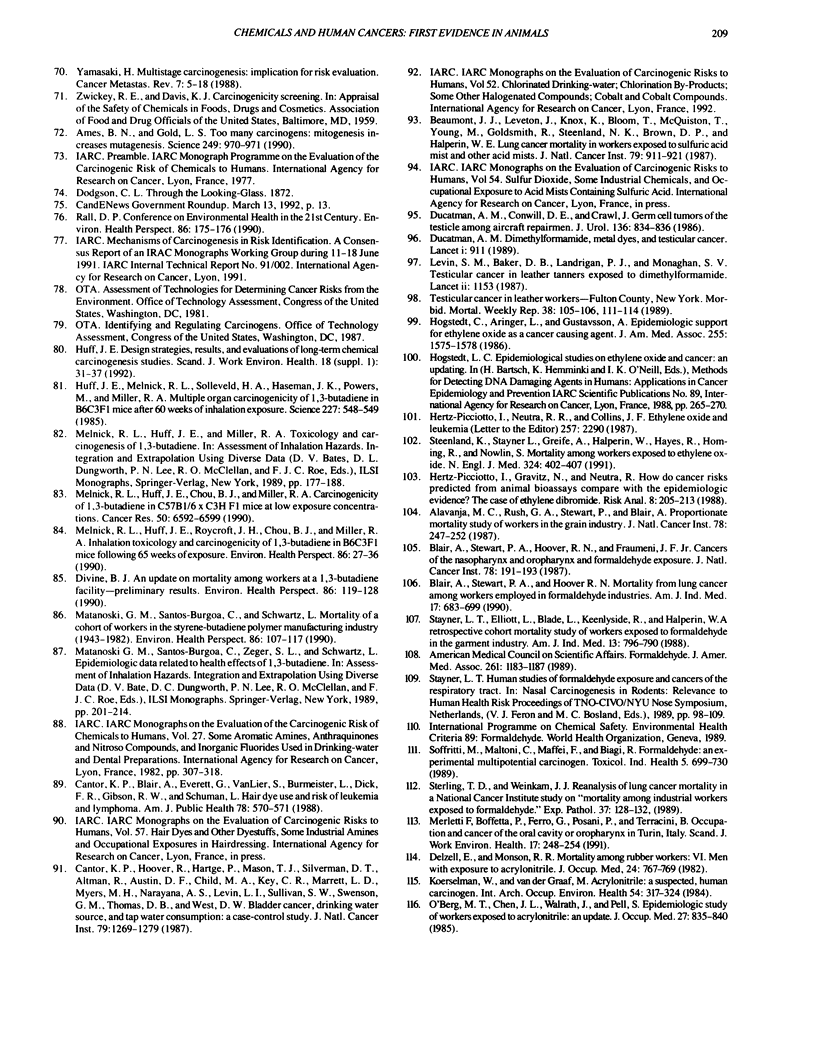
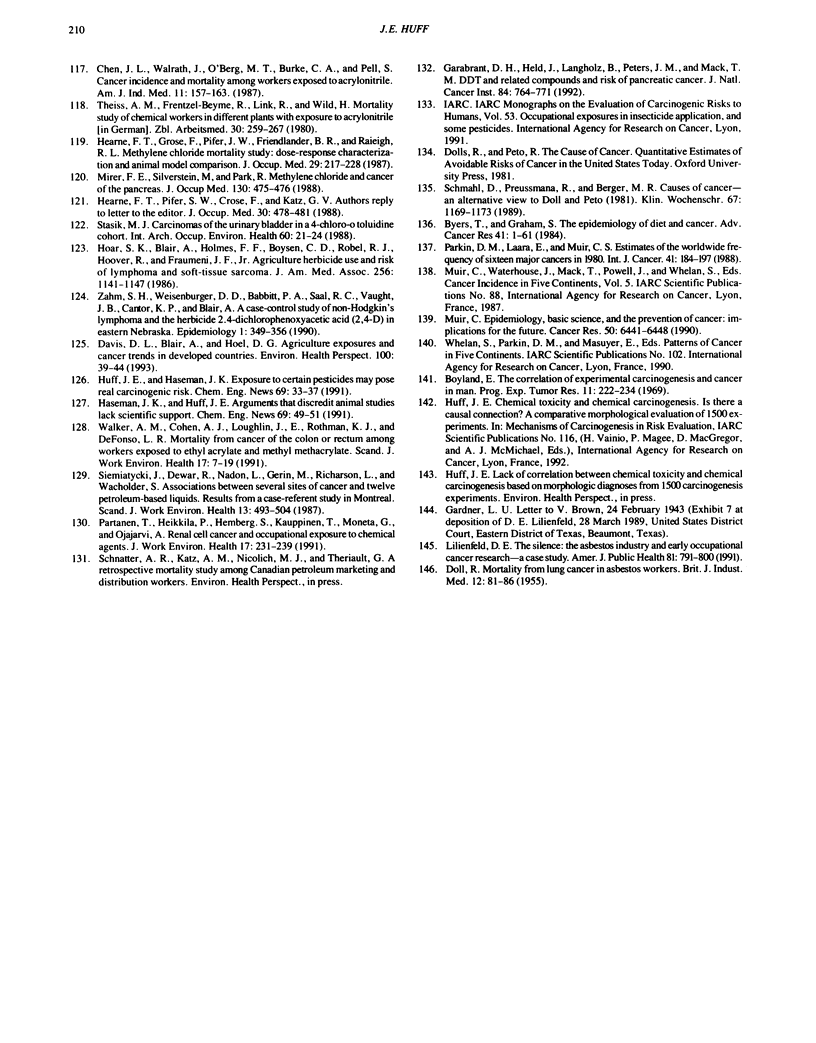
Selected References
These references are in PubMed. This may not be the complete list of references from this article.
- Alavanja M. C., Rush G. A., Stewart P., Blair A. Proportionate mortality study of workers in the grain industry. J Natl Cancer Inst. 1987 Feb;78(2):247–252. [PubMed] [Google Scholar]
- Ames B. N., Gold L. S. Too many rodent carcinogens: mitogenesis increases mutagenesis. Science. 1990 Aug 31;249(4972):970–971. doi: 10.1126/science.2136249. [DOI] [PubMed] [Google Scholar]
- Bannasch P., Hacker H. J., Klimek F., Mayer D., Stumpf H., Zerban H. Cytochemical, microbiochemical and molecular genetic analysis of chemical carcinogenesis. Prog Histochem Cytochem. 1991;23(1-4):45–60. doi: 10.1016/s0079-6336(11)80168-3. [DOI] [PubMed] [Google Scholar]
- Barrett J. C. Mechanisms of multistep carcinogenesis and carcinogen risk assessment. Environ Health Perspect. 1993 Apr;100:9–20. doi: 10.1289/ehp.931009. [DOI] [PMC free article] [PubMed] [Google Scholar]
- Beaumont J. J., Leveton J., Knox K., Bloom T., McQuiston T., Young M., Goldsmith R., Steenland N. K., Brown D. P., Halperin W. E. Lung cancer mortality in workers exposed to sulfuric acid mist and other acid mists. J Natl Cancer Inst. 1987 Nov;79(5):911–921. [PubMed] [Google Scholar]
- Bertram J. S., Kolonel L. N., Meyskens F. L., Jr Rationale and strategies for chemoprevention of cancer in humans. Cancer Res. 1987 Jun 1;47(11):3012–3031. [PubMed] [Google Scholar]
- Blair A., Stewart P. A., Hoover R. N., Fraumeni J. F., Jr, Walrath J., O'Berg M., Gaffey W. Cancers of the nasopharynx and oropharynx and formaldehyde exposure. J Natl Cancer Inst. 1987 Jan;78(1):191–193. doi: 10.1093/jnci/78.1.191. [DOI] [PubMed] [Google Scholar]
- Blair A., Stewart P. A., Hoover R. N. Mortality from lung cancer among workers employed in formaldehyde industries. Am J Ind Med. 1990;17(6):683–699. doi: 10.1002/ajim.4700170604. [DOI] [PubMed] [Google Scholar]
- Boyd J. A., Barrett J. C. Genetic and cellular basis of multistep carcinogenesis. Pharmacol Ther. 1990;46(3):469–486. doi: 10.1016/0163-7258(90)90028-z. [DOI] [PubMed] [Google Scholar]
- Boyland E. The correlation of experimental carcinogenesis and cancer in man. Prog Exp Tumor Res. 1969;11:222–234. doi: 10.1159/000391396. [DOI] [PubMed] [Google Scholar]
- Bucher J. R. Methyl isocyanate: a review of health effects research since Bhopal. Fundam Appl Toxicol. 1987 Oct;9(3):367–379. doi: 10.1016/0272-0590(87)90019-4. [DOI] [PubMed] [Google Scholar]
- Cantor K. P., Blair A., Everett G., VanLier S., Burmeister L., Dick F. R., Gibson R. W., Schuman L. Hair dye use and risk of leukemia and lymphoma. Am J Public Health. 1988 May;78(5):570–571. doi: 10.2105/ajph.78.5.570. [DOI] [PMC free article] [PubMed] [Google Scholar]
- Cantor K. P., Hoover R., Hartge P., Mason T. J., Silverman D. T., Altman R., Austin D. F., Child M. A., Key C. R., Marrett L. D. Bladder cancer, drinking water source, and tap water consumption: a case-control study. J Natl Cancer Inst. 1987 Dec;79(6):1269–1279. [PubMed] [Google Scholar]
- Chen J. L., Walrath J., O'Berg M. T., Burke C. A., Pell S. Cancer incidence and mortality among workers exposed to acrylonitrile. Am J Ind Med. 1987;11(2):157–163. doi: 10.1002/ajim.4700110205. [DOI] [PubMed] [Google Scholar]
- Creech J. L., Jr, Johnson M. N. Angiosarcoma of liver in the manufacture of polyvinyl chloride. J Occup Med. 1974 Mar;16(3):150–151. [PubMed] [Google Scholar]
- DOLL R. Mortality from lung cancer in asbestos workers. Br J Ind Med. 1955 Apr;12(2):81–86. doi: 10.1136/oem.12.2.81. [DOI] [PMC free article] [PubMed] [Google Scholar]
- Davis D. L., Blair A., Hoel D. G. Agricultural exposures and cancer trends in developed countries. Environ Health Perspect. 1993 Apr;100:39–44. doi: 10.1289/ehp.9310039. [DOI] [PMC free article] [PubMed] [Google Scholar]
- Delzell E., Monson R. R. Mortality among rubber workers: VI. Men with potential exposure to acrylonitrile. J Occup Med. 1982 Oct;24(10):767–769. [PubMed] [Google Scholar]
- Divine B. J. An update on mortality among workers at a 1,3-butadiene facility--preliminary results. Environ Health Perspect. 1990 Jun;86:119–128. doi: 10.1289/ehp.9086119. [DOI] [PMC free article] [PubMed] [Google Scholar]
- Doll R. Occupational cancer: a hazard for epidemiologists. Int J Epidemiol. 1985 Mar;14(1):22–31. doi: 10.1093/ije/14.1.22. [DOI] [PubMed] [Google Scholar]
- Doll R. Occupational cancer: problems in interpreting human evidence. Ann Occup Hyg. 1984;28(3):291–305. doi: 10.1093/annhyg/28.3.291. [DOI] [PubMed] [Google Scholar]
- Ducatman A. M., Conwill D. E., Crawl J. Germ cell tumors of the testicle among aircraft repairmen. J Urol. 1986 Oct;136(4):834–836. doi: 10.1016/s0022-5347(17)45096-8. [DOI] [PubMed] [Google Scholar]
- Ducatman A. M. Dimethylformamide, metal dyes, and testicular cancer. Lancet. 1989 Apr 22;1(8643):911–911. doi: 10.1016/s0140-6736(89)92920-6. [DOI] [PubMed] [Google Scholar]
- Garabrant D. H., Held J., Langholz B., Peters J. M., Mack T. M. DDT and related compounds and risk of pancreatic cancer. J Natl Cancer Inst. 1992 May 20;84(10):764–771. doi: 10.1093/jnci/84.10.764. [DOI] [PubMed] [Google Scholar]
- Hearne F. T., Grose F., Pifer J. W., Friedlander B. R., Raleigh R. L. Methylene chloride mortality study: dose-response characterization and animal model comparison. J Occup Med. 1987 Mar;29(3):217–228. [PubMed] [Google Scholar]
- Hertz-Picciotto I., Gravitz N., Neutra R. How do cancer risks predicted from animal bioassays compare with the epidemiologic evidence? The case of ethylene dibromide. Risk Anal. 1988 Jun;8(2):205–214. doi: 10.1111/j.1539-6924.1988.tb01173.x. [DOI] [PubMed] [Google Scholar]
- Hertz-Picciotto I., Neutra R. R., Collins J. F. Ethylene oxide and leukemia. JAMA. 1987 May 1;257(17):2290–2290. doi: 10.1001/jama.257.17.2290b. [DOI] [PubMed] [Google Scholar]
- Hoar S. K., Blair A., Holmes F. F., Boysen C. D., Robel R. J., Hoover R., Fraumeni J. F., Jr Agricultural herbicide use and risk of lymphoma and soft-tissue sarcoma. JAMA. 1986 Sep 5;256(9):1141–1147. [PubMed] [Google Scholar]
- Hogstedt C., Aringer L., Gustavsson A. Epidemiologic support for ethylene oxide as a cancer-causing agent. JAMA. 1986 Mar 28;255(12):1575–1578. [PubMed] [Google Scholar]
- Huff J. E., Melnick R. L., Solleveld H. A., Haseman J. K., Powers M., Miller R. A. Multiple organ carcinogenicity of 1,3-butadiene in B6C3F1 mice after 60 weeks of inhalation exposure. Science. 1985 Feb 1;227(4686):548–549. doi: 10.1126/science.3966163. [DOI] [PubMed] [Google Scholar]
- Huff J. E., Salmon A. G., Hooper N. K., Zeise L. Long-term carcinogenesis studies on 2,3,7,8-tetrachlorodibenzo-p-dioxin and hexachlorodibenzo-p-dioxins. Cell Biol Toxicol. 1991 Jan;7(1):67–94. doi: 10.1007/BF00121331. [DOI] [PubMed] [Google Scholar]
- Huff J. A historical perspective on the classification developed and used for chemical carcinogens by the National Toxicology Program during 1983-1992. Scand J Work Environ Health. 1992;18 (Suppl 1):74–82. [PubMed] [Google Scholar]
- Huff J., Bucher J., Yang R. Carcinogenesis studies in rodents for evaluating risks associated with chemical carcinogens in aquatic food animals. Environ Health Perspect. 1991 Jan;90:127–132. doi: 10.1289/ehp.90-1519487. [DOI] [PMC free article] [PubMed] [Google Scholar]
- Huff J., Cirvello J., Haseman J., Bucher J. Chemicals associated with site-specific neoplasia in 1394 long-term carcinogenesis experiments in laboratory rodents. Environ Health Perspect. 1991 Jun;93:247–270. doi: 10.1289/ehp.9193247. [DOI] [PMC free article] [PubMed] [Google Scholar]
- Huff J. Design strategies, results and evaluations of long-term chemical carcinogenesis studies. Scand J Work Environ Health. 1992;18 (Suppl 1):31–37. [PubMed] [Google Scholar]
- Huff J., Haseman J. Long-term chemical carcinogenesis experiments for identifying potential human cancer hazards: collective database of the National Cancer Institute and National Toxicology Program (1976-1991). Environ Health Perspect. 1991 Dec;96:23–31. doi: 10.1289/ehp.919623. [DOI] [PMC free article] [PubMed] [Google Scholar]
- Huff J., Haseman J., Rall D. Scientific concepts, value, and significance of chemical carcinogenesis studies. Annu Rev Pharmacol Toxicol. 1991;31:621–652. doi: 10.1146/annurev.pa.31.040191.003201. [DOI] [PubMed] [Google Scholar]
- Huff J., Hoel D. Perspective and overview of the concepts and value of hazard identification as the initial phase of risk assessment for cancer and human health. Scand J Work Environ Health. 1992;18 (Suppl 1):83–89. [PubMed] [Google Scholar]
- Koerselman W., van der Graaf M. Acrylonitrile: a suspected human carcinogen. Int Arch Occup Environ Health. 1984;54(4):317–324. doi: 10.1007/BF00378585. [DOI] [PubMed] [Google Scholar]
- Levin S. M., Baker D. B., Landrigan P. J., Monaghan S. V., Frumin E., Braithwaite M., Towne W. Testicular cancer in leather tanners exposed to dimethylformamide. Lancet. 1987 Nov 14;2(8568):1153–1153. doi: 10.1016/s0140-6736(87)91587-x. [DOI] [PubMed] [Google Scholar]
- Lilienfeld D. E. The silence: the asbestos industry and early occupational cancer research--a case study. Am J Public Health. 1991 Jun;81(6):791–800. doi: 10.2105/ajph.81.6.791. [DOI] [PMC free article] [PubMed] [Google Scholar]
- Maltoni C., Lefemine G., Chieco P., Carretti D. Vinyl chloride carcinogenesis: current results and perspectives. Med Lav. 1974 Nov-Dec;65(11-12):421–444. [PubMed] [Google Scholar]
- Matanoski G. M., Santos-Burgoa C., Schwartz L. Mortality of a cohort of workers in the styrene-butadiene polymer manufacturing industry (1943-1982). Environ Health Perspect. 1990 Jun;86:107–117. doi: 10.1289/ehp.9086107. [DOI] [PMC free article] [PubMed] [Google Scholar]
- Melnick R. L., Huff J. E., Roycroft J. H., Chou B. J., Miller R. A. Inhalation toxicology and carcinogenicity of 1,3-butadiene in B6C3F1 mice following 65 weeks of exposure. Environ Health Perspect. 1990 Jun;86:27–36. doi: 10.1289/ehp.908627. [DOI] [PMC free article] [PubMed] [Google Scholar]
- Melnick R. L., Huff J. 1,3-Butadiene: toxicity and carcinogenicity in laboratory animals and in humans. Rev Environ Contam Toxicol. 1992;124:111–144. doi: 10.1007/978-1-4612-2864-6_5. [DOI] [PubMed] [Google Scholar]
- Melnick R. L., Huff J., Chou B. J., Miller R. A. Carcinogenicity of 1,3-butadiene in C57BL/6 x C3H F1 mice at low exposure concentrations. Cancer Res. 1990 Oct 15;50(20):6592–6599. [PubMed] [Google Scholar]
- Melnick R. L., Shackelford C. C., Huff J. Carcinogenicity of 1,3-butadiene. Environ Health Perspect. 1993 Apr;100:227–236. doi: 10.1289/ehp.93100227. [DOI] [PMC free article] [PubMed] [Google Scholar]
- Merletti F., Boffetta P., Ferro G., Pisani P., Terracini B. Occupation and cancer of the oral cavity or oropharynx in Turin, Italy. Scand J Work Environ Health. 1991 Aug;17(4):248–254. doi: 10.5271/sjweh.1706. [DOI] [PubMed] [Google Scholar]
- Merletti F., Heseltine E., Saracci R., Simonato L., Vainio H., Wilbourn J. Target organs for carcinogenicity of chemicals and industrial exposures in humans: a review of results in the IARC monographs on the evaluation of the carcinogenic risk of chemicals to humans. Cancer Res. 1984 May;44(5):2244–2250. [PubMed] [Google Scholar]
- Mirer F. E., Silverstein M., Park R. Methylene chloride and cancer of the pancreas. J Occup Med. 1988 Jun;30(6):475-6, 478, 480-1. [PubMed] [Google Scholar]
- Muir C. S. Epidemiology, basic science, and the prevention of cancer: implications for the future. Cancer Res. 1990 Oct 15;50(20):6441–6448. [PubMed] [Google Scholar]
- O'Berg M. T., Chen J. L., Burke C. A., Walrath J., Pell S. Epidemiologic study of workers exposed to acrylonitrile: an update. J Occup Med. 1985 Nov;27(11):835–840. doi: 10.1097/00043764-198511000-00018. [DOI] [PubMed] [Google Scholar]
- Parkin D. M., Lärä E., Muir C. S. Estimates of the worldwide frequency of sixteen major cancers in 1980. Int J Cancer. 1988 Feb 15;41(2):184–197. doi: 10.1002/ijc.2910410205. [DOI] [PubMed] [Google Scholar]
- Partanen T., Heikkilä P., Hernberg S., Kauppinen T., Moneta G., Ojajärvi A. Renal cell cancer and occupational exposure to chemical agents. Scand J Work Environ Health. 1991 Aug;17(4):231–239. doi: 10.5271/sjweh.1708. [DOI] [PubMed] [Google Scholar]
- Radike M. J., Stemmer K. L., Bingham E. Effect of ethanol on vinyl chloride carcinogenesis. Environ Health Perspect. 1981 Oct;41:59–62. doi: 10.1289/ehp.814159. [DOI] [PMC free article] [PubMed] [Google Scholar]
- Rall D. P., Hogan M. D., Huff J. E., Schwetz B. A., Tennant R. W. Alternatives to using human experience in assessing health risks. Annu Rev Public Health. 1987;8:355–385. doi: 10.1146/annurev.pu.08.050187.002035. [DOI] [PubMed] [Google Scholar]
- Rall D. P. Issues in the determination of acceptable risk. Ann N Y Acad Sci. 1981;363:139–144. doi: 10.1111/j.1749-6632.1981.tb20727.x. [DOI] [PubMed] [Google Scholar]
- Rall D. P. Laboratory animal toxicity and carcinogenesis testing. Underlying concepts, advantages and constraints. Ann N Y Acad Sci. 1988;534:78–83. doi: 10.1111/j.1749-6632.1988.tb30095.x. [DOI] [PubMed] [Google Scholar]
- Rall D. P. Relevance of animal experiments to humans. Environ Health Perspect. 1979 Oct;32:297–300. doi: 10.1289/ehp.7932297. [DOI] [PMC free article] [PubMed] [Google Scholar]
- Rall D. P. Thresholds? Environ Health Perspect. 1978 Feb;22:163–165. doi: 10.1289/ehp.7822163. [DOI] [PMC free article] [PubMed] [Google Scholar]
- Schmähl D., Preussmann R., Berger M. R. Causes of cancer--an alternative view to Doll and Peto (1981). Klin Wochenschr. 1989 Dec 4;67(23):1169–1173. doi: 10.1007/BF01716203. [DOI] [PubMed] [Google Scholar]
- Siemiatycki J., Dewar R., Nadon L., Gérin M., Richardson L., Wacholder S. Associations between several sites of cancer and twelve petroleum-derived liquids. Results from a case-referent study in Montreal. Scand J Work Environ Health. 1987 Dec;13(6):493–504. doi: 10.5271/sjweh.2008. [DOI] [PubMed] [Google Scholar]
- Soffritti M., Maltoni C., Maffei F., Biagi R. Formaldehyde: an experimental multipotential carcinogen. Toxicol Ind Health. 1989 Oct;5(5):699–730. doi: 10.1177/074823378900500510. [DOI] [PubMed] [Google Scholar]
- Stasik M. J. Carcinomas of the urinary bladder in a 4-chloro-o-toluidine cohort. Int Arch Occup Environ Health. 1988;60(1):21–24. doi: 10.1007/BF00409374. [DOI] [PubMed] [Google Scholar]
- Sterling T. D., Weinkam J. J. Reanalysis of lung cancer mortality in a National Cancer Institute Study on "Mortality among industrial workers exposed to formaldehyde". Exp Pathol. 1989;37(1-4):128–132. doi: 10.1016/s0232-1513(89)80030-1. [DOI] [PubMed] [Google Scholar]
- Tomatis L., Agthe C., Bartsch H., Huff J., Montesano R., Saracci R., Walker E., Wilbourn J. Evaluation of the carcinogenicity of chemicals: a review of the Monograph Program of the International Agency for Research on Cancer (1971 to 1977). Cancer Res. 1978 Apr;38(4):877–885. [PubMed] [Google Scholar]
- Tomatis L., Aitio A., Wilbourn J., Shuker L. Human carcinogens so far identified. Jpn J Cancer Res. 1989 Sep;80(9):795–807. doi: 10.1111/j.1349-7006.1989.tb01717.x. [DOI] [PMC free article] [PubMed] [Google Scholar]
- Tomatis L. Environmental cancer risk factors. A review. Acta Oncol. 1988;27(5):465–472. doi: 10.3109/02841868809093572. [DOI] [PubMed] [Google Scholar]
- Tomatis L. The contribution of the IARC monographs program to the identification of cancer risk factors. Ann N Y Acad Sci. 1988;534:31–38. doi: 10.1111/j.1749-6632.1988.tb30086.x. [DOI] [PubMed] [Google Scholar]
- Tomatis L. The predictive value of rodent carcinogenicity tests in the evaluation of human risks. Annu Rev Pharmacol Toxicol. 1979;19:511–530. doi: 10.1146/annurev.pa.19.040179.002455. [DOI] [PubMed] [Google Scholar]
- Vainio H., Haseltine E., McGregor D., Tomatis L., Wilbourn J. Working group on mechanisms of carcinogenesis and evaluation of carcinogenic risks. Cancer Res. 1992 Apr 15;52(8):2357–2361. [PubMed] [Google Scholar]
- Vainio H., Hemminki K., Wilbourn J. Data on the carcinogenicity of chemicals in the IARC Monographs programme. Carcinogenesis. 1985 Nov;6(11):1653–1665. doi: 10.1093/carcin/6.11.1653. [DOI] [PubMed] [Google Scholar]
- Vanden Heuvel J. P., Lucier G. Environmental toxicology of polychlorinated dibenzo-p-dioxins and polychlorinated dibenzofurans. Environ Health Perspect. 1993 Apr;100:189–200. doi: 10.1289/ehp.93100189. [DOI] [PMC free article] [PubMed] [Google Scholar]
- Viola P. L., Bigotti A., Caputo A. Oncogenic response of rat skin, lungs, and bones to vinyl chloride. Cancer Res. 1971 May;31(5):516–522. [PubMed] [Google Scholar]
- Walker A. M., Cohen A. J., Loughlin J. E., Rothman K. J., DeFonso L. R. Mortality from cancer of the colon or rectum among workers exposed to ethyl acrylate and methyl methacrylate. Scand J Work Environ Health. 1991 Feb;17(1):7–19. doi: 10.5271/sjweh.1731. [DOI] [PubMed] [Google Scholar]
- Wilbourn J., Haroun L., Heseltine E., Kaldor J., Partensky C., Vainio H. Response of experimental animals to human carcinogens: an analysis based upon the IARC Monographs programme. Carcinogenesis. 1986 Nov;7(11):1853–1863. doi: 10.1093/carcin/7.11.1853. [DOI] [PubMed] [Google Scholar]
- Yamasaki H. Multistage carcinogenesis: implications for risk estimation. Cancer Metastasis Rev. 1988 Apr;7(1):5–18. doi: 10.1007/BF00048275. [DOI] [PubMed] [Google Scholar]
- Zahm S. H., Weisenburger D. D., Babbitt P. A., Saal R. C., Vaught J. B., Cantor K. P., Blair A. A case-control study of non-Hodgkin's lymphoma and the herbicide 2,4-dichlorophenoxyacetic acid (2,4-D) in eastern Nebraska. Epidemiology. 1990 Sep;1(5):349–356. doi: 10.1097/00001648-199009000-00004. [DOI] [PubMed] [Google Scholar]


